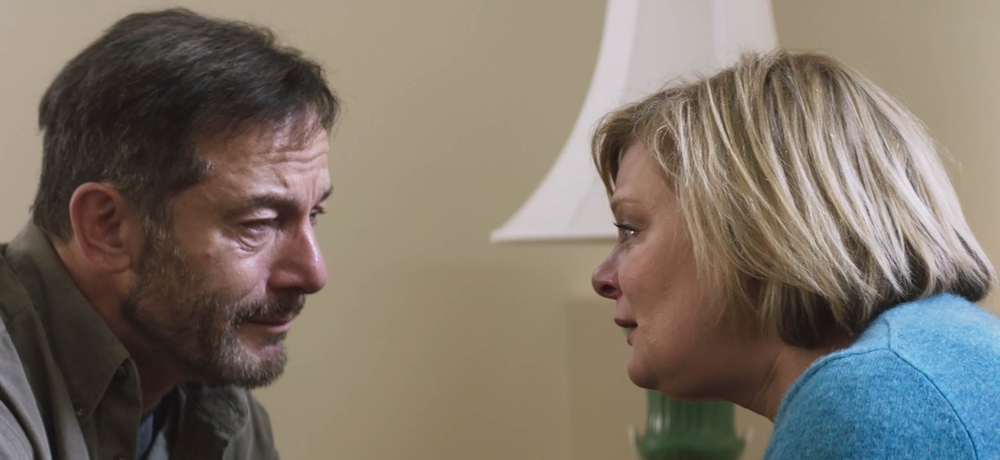


“He destroyed your lives, all of our lives,” Jay (Jason Isaacs) says to Linda (Ann Dowd) and Richard (Reed Birney). He and his wife, Gail (Martha Plimpton), are the parents who lost their son, Evan, to a high school mass shooting. Hayden—Linda and Richard's son—was the one who committed the mass shooting. Mass, an outstanding directional debut from Fran Kranz, leaves you in tears and many reflections on grief, forgiveness, and the United States' gun politics.
It begins with an awkward preparation of a room in a local church. Judy (Breeda Wool) listens to every word of Kendra's advice (Michelle N. Carter). The latter wants to make sure the atmosphere for this unusual meeting is just right. When Gail and Jay arrive and, ten minutes later, they meet Linda and Richard, all bets are off. The anxiety and uncomfortable tension arise from the very moment both families meet. It's an indescribable kind of stress, the one that only people who can relate on a personal level can truly feel. Finally, they decide to meet and talk about the aftermath of Hayden's actions.
Once they start talking, everything begins to unfurl. It feels off. The simple pleasantries sound artificial as they all sit down at the round table in the middle of the room. The only thing the audience can think of is, "Your child killed these students," and "Their son murdered your son." We admire Gail's reservation and Jay's kind manners. We quickly realize that there have been years of non-stop therapy. On the other side, Linda is generous. She patiently answers all of their questions. She explains that Hayden was shy as a child. That he collected snails. That she wouldn't ever dream of him committing such an act. The only person who's remarkably defensive is Richard. While Jay and Gail want to know the reason why, Richard keeps reflecting and assuring that "they did whatever they could."
Kranz creates something unusual with Mass. From the moment the meeting starts, you're holding your breath and waiting for one of the characters to explode at one another. But the director takes his time and lets his characters slowly unfold the truth that we are yearning to learn. We spend almost two hours with four people contained in a small, unpretentious church room, talking about their brutal past and the aftereffect of Hayden's actions that affected all of the hurt families—including his own. We're never bored. As an audience, we soak up every word spoken from the characters' lips like a sponge. As time passes, they are bound to break.
The cast of Mass is unbelievably talented and unquestionably heartbreaking. Sincerely, Ann Dowd and Martha Plimpton go above and beyond and deliver profound, award-worthy portrayals of mothers who both lost their sons. They have to cope with the consequence of this country's relaxed gun restrictions. Everything reaches its momentum when Plimpton's Gail breaks down into one of the most heartbreaking monologues. Her speech about her son's memory and forgiveness is deeply devastating, raw, emotionally charged, and extremely thought-provoking. It's one of the best monologues about grief in the film. As Gail, Plimpton gives everything that she simply possesses to truly convey the emotions that a mother can feel after losing a child and attempting to cope with it. We break down as we listen to her words, we see Linda's emotions in her facial expressions, and we cannot stop but finally think about the other side.
In Kranz's scenario, it's practically impossible to choose the side. One would think it would be easy, considering. But Dowd's emotional performance makes you question what you previously thought you knew. The actress' momentum happens during the heartbreaking finale that comes unexpectedly because we believed that everything is over. Comparable to Plimpton, Down graces us with the tragic, stirring monologue that breaks our hearts and makes us question our stances. In the end, we feel for both families. We hear Linda's excruciating pain; we try to understand Richard's standoffish attitude. For once, the audience has a chance to consider the feelings of parents whose son was the mass shooter.
Mass truly breaks any boundaries and is one of a few films that delve into another side of the story in this scenario. But, thanks to Linda and Richard, we learn about Hayden and how he was. We can endure their experiences as we never could before.
Kranz's film will stimulate many conversations about the mental health system in which the United States lacks much, the issue of easy gun access, and much more. Mass is not an easy film to watch, but we must view it and talk about it. The film is a very powerful depiction of loss, forgiveness, and the coming together of two sides. The names of Plimpton, Dowd, Issacs, and Birney are worth remembering—we're going to hear a lot about them this year, that's for sure.
Movie Score: 5/5
----------
Visit our online hub to catch up on all of our Sundance interviews and reviews!
[Photo Credit: Photo courtesy of Ryan Jackson-Healy/Sundance Institute.]